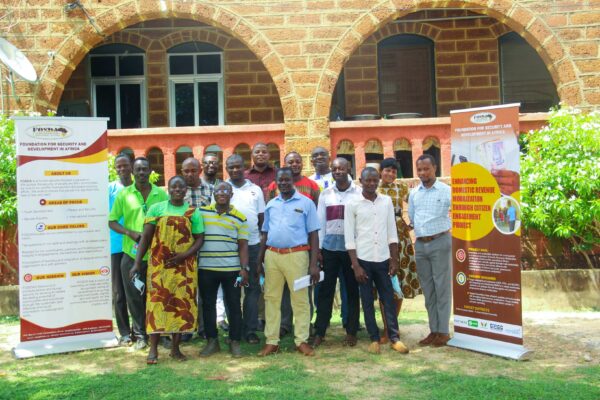Assembly members in the Jirapa Municipal Assembly have called on management and contractors to label all projects funded with Internal Generated Funds (IGF) in the municipality. According to them this is key in helping to increase domestic revenue mobilization in the district to meet the funding of more pro-poor services. This call was made at a stakeholder consultation on digitization of domestic revenue systems organized by the Foundation for Security and Development in Africa (FOSDA)
They have observed that little is known about some projects that were funded with IGF in the district and as a result most potential rate and toll payers are mostly reluctant in paying rates to the assembly.
“When you look at the Jirapa market for instance even some portion of the shed is broken so market women sit in the sun to trade yet they pay tolls of 1 cedi every day; what is the motivation for people to pay more” a participant quizzed. Other participants indicated that with the changing face of technology in government business more needs to be done in terms of educating the people more on digital tools because of the literacy levels of the residents which is low.
“Before we undertake any move to digitize IGF systems, we must consider first the literacy levels of the citizens because they will be using these digital tools. We have to educate citizens more on these technologies because their literacy levels in the district is low. Their level of education and understanding of the tools will lead to its success”
Speaking to participants in the meeting FOSDA Programmes Officer, Solomon Okai indicated that a 2020 survey on youth business in 17 districts showed that youth contribution to IGF shrunk by 30% as a result of the COVID-19 pandemic. As a result, 45% of youth businesses are adapting digital tools to transact their businesses. He added that digitization is key in revenue mobilization especially with the pandemic exposing opportunities in that space because the communication service tax (CST) was the only revenue item to exceed its target by 80% at the height of the pandemic in 2020. He shared experiences from the district assessment tool and national automation drive.
“From our study 45% of youth businesses are going into automation, the CST last year exceeded its target by 80% and importantly the District Performance Assessment Tool (DPAT) has allocated 8 points to revenue performance, particularly additional 1 point for deploying technology. What this means it that the districts must take inspiration and advantage to digitize their IGF systems”
Stakeholders were consulted on the FOSDA study findings on the impact of COVID-19 on domestic revenue; the case for automation of IGF, income and IGF performance from 2018-2020 from the Auditor General’s report and the draft of Revenue Improvement Action Plan (RIAP).
Participants in the consultative meeting included the Presiding Member, Assembly Members, youth groups and citizens representatives. The meeting was on the theme “Leveraging on Automation for Post-COVID reset of Local Economies” with support from OXFAM in Ghana under the Economic and Social Justice (ESJ) program.

